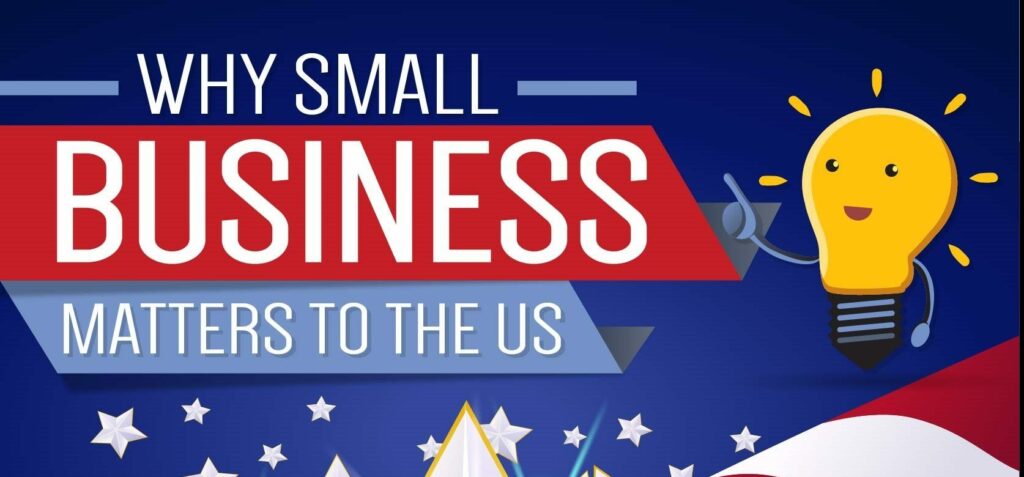-
 12 min. read
12 min. read
-
 WebFX Team
WebFX Team Digital Marketing Agency
Digital Marketing Agency
- The WebFX team is made up of more than 450 subject matter experts in digital marketing, SEO, web design and web development, social media, and more. Together, they’ve helped WebFX’s clients earn more than $3 billion in revenue from the web — and that’s just in the past five years. @webfx
Today, the US is a hotbed of startups and small businesses. Even with the popularity of the Internet and multi-national corporations, small businesses are much more common and more likely to impact your life than industry giants.
But what’s the fuss about small business, anyway? Chains are everywhere, and you can probably go months at a time without buying something or using a service from the mom-and-pop around the block.
While that may be true, chains aren’t the only business in town.
And as the US becomes more startup-happy and tech-based, small businesses are cropping up from Silicon Valley to New York City and everywhere in between. Check out the stats below to see why small businesses are critical to the United States. 
Bill Rancic on small business

Bill Rancic is an American entrepreneur with a long track record of success.
That’s why we started the infographic with a quote straight from him.
“I’m a big fan of small business ownership. I think it’s the backbone of American innovation. But to be successful, you first have to have the courage to go for it.”
Rancic’s words are important because they encompass the natural benefits of a small business.
- Innovation
- Courage
Among other qualities, these two ideas are where every entrepreneur starts. They get an idea, and then they muster the courage to actually go for it. That courage includes all of the research and coordination that small businesses need to do to get started.
Without an idea and the drive to follow it, why even start a small business in the first place?
General statistics on American small business

First, it’s important to note that when we’re talking about small businesses, we’re only referring to companies with fewer than 500 employees. With that in mind, it’s still possible for a company to have multiple locations and several hundred employees before they reach “big business” status. Altogether, there are 28 million small businesses in the US that employ almost 116 million people — more than 1/3 of the country.
That huge employment is a direct result of the surge in new small businesses throughout the country. As a whole, the US has nearly 50% more small businesses in it today than it had in 1982. Even more impressively, all small business accounts for 54% of all US sales. So even though big corporations might have more spending power and bigger customer bases than any one small business, small business as a whole still moves more product. And, surprisingly, most small businesses don’t have any additional employees, aside from the proprietor.
23 million of them, or 82% of all small businesses, are single-person non-employers. That means one person is doing all the heavy lifting in that operation, whether they’re a plumber, entertainer, or anything else. Part of the reason there are so many single-person small businesses is because it barely takes any time at all to start a company.
In fact, you can start one in six days with only $325, on average.
That plays a big role in why so many US small business owners are immigrants. Even if you come to the US with nothing, you can still earn enough to open your own company. Even more surprising is that only 33% of small businesses rely on credit for financing, meaning most of them already have enough money to establish themselves and stay out of bankruptcy.
Then again, if you’re a single-person company, it’s easy to work with minimal overhead. That’s especially true when you work out of your own house, like 54% of small businesses, instead of spending for office space and a whole new set of utilities. And last, there’s the support.
94% of Americans believe that it’s important to support small businesses. While that may not directly fill your bank account, it does mean that you have community support almost no matter where you go. That stat is even more fascinating because of how hard it is to find another time when 94% of Americans agreed about anything.
Steve Jobs on small business survival

Who better to talk about the benefits of small business than someone who helped take a company from a garage to a $700 billion trendsetting titan?
Steve Jobs’ quote comes from his experience working with Steve Wozniak and Ronald Wayne in 1976.
“I’m convinced that about half of what separates the successful entrepreneurs from the non-successful ones is pure perseverance.”
Is he right? It depends on your perspective and experience with business. But as the face of the world’s biggest (and hippest) technology company, he’s probably onto something.
Statistics on American small business survival

Aside from Jobs’ quote, this is the bunch of stats that catches most people’s attention whenever someone starts talking about small business — survival.
If you listen to the news or read business publications, it might sound like small businesses are generally poor investments. But that’s not 100% true. But let’s start with the bad.
First of all, only 19.5% of businesses that were founded in 1994 existed in 2015. That means 80.5% of all companies didn’t make it to their first legal drink before they disappeared. But is that really evidence that small businesses don’t succeed? Surprisingly, no.
Just because a business disappears does not mean that it failed. It actually means the opposite most of the time — a bigger company acquired a small business, and the owner probably made a decent amount of money from the sale! And this isn’t just conjecture.
According to Reuters, acquisitions were at a seven-year high in 2014, and the Institute for Mergers, Acquisitions, and Alliances shows an incredible increase in M&A during the 1990s and 2000s. What’s that mean for small business? You might go out of business — but only because someone bought you out for a lot more than the $325 you spent to start it all.
With all of that acquiring, it’s surprising to see that big businesses have eliminated 4 million jobs since 1990. But, since they did that, all of those people (and then some) had to go somewhere, which is why small business added 8 million jobs in the same timeframe. That means the American economy as a whole netted 4 million new jobs, all thanks to small business. Even so, not all of those companies made it through their first year, and they all couldn’t get a nice buyout from a big company either.
Tragically, 20.5% of new businesses tend to close before they reach their first anniversary. If you look at five years, 51.9% of new businesses close before they reach hypothetical kindergarten. However, there’s light at the end of the tunnel.
If you’re one of the 48.1% of companies that makes it past five years, you suddenly have a 90% chance to survive to the next year. And after 20 years, you have a 96% chance. While that sounds great, numbers can only promise so much.
There’s always the chance something can happen — like a natural disaster. In fact, that’s a major reason why many businesses have to close their doors, even ones that have been around for longer than 20 years. If you can’t get your business running within 10 days after a natural disaster, you have an 80% chance of failing within the next month.
Flood insurance might cost a bundle — but if it helps you stay in business one time, it’ll pay for itself.
Neal Stephenson on small business franchises

Neal Stephenson — who we’ve mentioned before — is an American writer best known for his work in speculative and futuristic fiction. His books typically deal with issues revolving around the future or modern society, and he’s also a contributor to Wired, an advisor for a team developing a sub-orbital launch system, and a game designer. But it’s his exploration of modern society (and the potential of future society) that gives him such a pointed, yet accurate description of franchises.
“The franchise and the virus work on the same principle: What thrives in one place with thrive in another.”
On first read, it’s not the most flattering description of the franchise system.
But that is essentially what franchises do. The entire idea behind franchised chain restaurants is that something succeeded in one place, so it would probably succeed in another.
Statistics on American small business franchises

That’s why there are around 600,000 franchised businesses in the US, including retail, foodservice, and other industries. Altogether, they employ roughly 8 million people, about 2.5% of the American population, but account for 40% of all retail sales.
That’s an enormous part of the economy, especially since retail is almost entirely consumer goods. But, on the flip side, 34.7% of all franchises fail before they reach 4 years old. Granted, that’s a better chance than a small business starting from scratch.
But that’s still a surprising failure rate for businesses that have a corporate sponsor at their back. That number is actually worse for retailers as well, with 38.7% of retail franchises dying before 4 years. All things considered, that’s still safer than starting your own business.
But it’s also proof that no company is safe from economic trends — even franchises can bite the dust, if circumstances get too drastic.
Richard Branson on small business industries

Whenever you talk about small businesses, you also have to talk about their industries. And who better to talk about different industries than someone who has a business in almost all of them? That’s why Richard Branson, the founder of multi-national, horizontally-integrated corporation Virgin, is such a good source on any issue about industry.
“Above all, you want to create something you are proud of.
That’s always been my philosophy in business.”
Branson’s words are important for anyone looking to start their own business because — as counter-intuitive as it might sound — your passions should guide you to your ideal business. That means you don’t start a company just to make money from it. You start one because it scratches an itch or indulges a passion.
Your passion could be automotive restoration, SEO, or leading nature hikes. Regardless, you’re going to work harder (and better) for something you love than something that’s just making you money.
Statistics on small business industries
Because of that — and recent American economic trends — it makes sense that the most popular industry for small businesses is professional services right now. WebFX actually falls into that category since we have fewer than 500 employees and offer services directly to businesses.
With that in mind, the entire SEO industry — and others — falls into this category. It’s such a big catch-all that you could arguably characterize every B2B in this category. It’s also incredibly easy to start a technical services company.
All you need is a computer and some experience, and you can probably do everything from home (like more than half of other small businesses). On the other hand, the smallest industry for small businesses is utilities. That makes a lot of sense since utility suppliers generally have to be big, complex companies with connections to lots of other companies and local governments.
Utility companies need to offer services to large areas to turn a profit, and if they go beyond a single municipality, they need to make sure they’re compliant with laws in other areas. Crossing state lines is also a headache. If you started a utility company, you definitely need a full legal team on your side just so you can be sure you’re not breaking any laws.
And if you do break a law, you can expect a hefty fine that’ll put a dent in your profits. Still, neither of these industries employs the most workers. That distinction belongs to healthcare and social assistance, an industry that covers everything from hospitals to assisted living communities.
Combined, that industry employs 18,378,342 people or 16% of all small business employees. Considering nurses alone is one of the most in-demand professions in the country, it’s safe to assume that a lot of them contribute to this number. Then, you also have doctors, technicians, food service workers, janitorial staff and other essential personnel that help a healthcare company operate day-to-day.
And, on the other end of the spectrum, you have the industry with the fewest employees — agriculture, forestry, fishing, and hunting. By necessity, these businesses operate in low-population areas. You couldn’t grow wheat for New York City in the middle of Manhattan, and you couldn’t trap deer in the Bronx.
This industry thrives in less-developed areas, like Central Pennsylvania or Wyoming, and that means there will be fewer potential employees for those companies. That doesn’t mean they’re not popular — they could be the primary industry of any small town in the United States. But it does mean that they have a natural disadvantage when it comes to overall employee numbers.
They need people to work fields, protect forests, catch fish, and hunt animals, but they’re just aren’t that many people around. Still, starting a company in this industry could be profitable. Like the success of every other small business, it depends on your market!
Helping your small business succeed
At WebFX, we help small businesses throughout the US succeed every day using strategies like search engine optimization (SEO).
Want to see for yourself? Take a look at our portfolio of customer successes!
-
 The WebFX team is made up of more than 450 subject matter experts in digital marketing, SEO, web design and web development, social media, and more. Together, they’ve helped WebFX’s clients earn more than $3 billion in revenue from the web — and that’s just in the past five years.@webfx
The WebFX team is made up of more than 450 subject matter experts in digital marketing, SEO, web design and web development, social media, and more. Together, they’ve helped WebFX’s clients earn more than $3 billion in revenue from the web — and that’s just in the past five years.@webfx -

WebFX is a full-service marketing agency with 1,100+ client reviews and a 4.9-star rating on Clutch! Find out how our expert team and revenue-accelerating tech can drive results for you! Learn more
Try our free Marketing Calculator
Craft a tailored online marketing strategy! Utilize our free Internet marketing calculator for a custom plan based on your location, reach, timeframe, and budget.
Plan Your Marketing Budget
Table of Contents
- Bill Rancic on Small Business
- General Statistics on American Small Business
- Steve Jobs on Small Business Survival
- Statistics on American Small Business Survival
- Neal Stephenson on Small Business Franchises
- Statistics on American Small Business Franchises
- Richard Branson on Small Business Industries
- Statistics on Small Business Industries
- Helping Your Small Business Succeed

Maximize Your Marketing ROI
Claim your free eBook packed with proven strategies to boost your marketing efforts.
Get the GuideTry our free Marketing Calculator
Craft a tailored online marketing strategy! Utilize our free Internet marketing calculator for a custom plan based on your location, reach, timeframe, and budget.
Plan Your Marketing Budget





